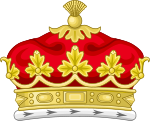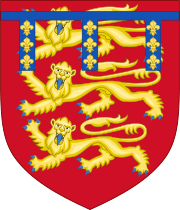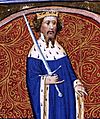Duke of Lancaster facts for kids
Quick facts for kids Dukedom of Lancaster |
|
|---|---|
 
The special crown of a British Duke and the shield (arms) of Henry of Grosmont.
|
|
| Creation date | 1351 (first time) 1362 (second time) 1399 (third time) |
| Monarch | Edward III (first and second times) Henry IV (third time) |
| Peerage | Peerage of England |
| First holder | Henry of Grosmont |
| Last holder | Henry V (became part of the Crown) |
| Subsidiary titles | First creation Earl of Derby Earl of Leicester Earl of Lancaster Earl of Lincoln Earl of Moray Second creation Earl of Richmond Earl of Leicester Earl of Lancaster Earl of Derby Third creation Earl of Chester (part of Prince of Wales titles) |
| Status | extinct (became part of the Crown) |
| Extinction date | 1361 (first time) 1399 (second time) 1413 (third time) |
| Former seat(s) | Lancaster Castle |
The Dukedom of Lancaster was an important title in old England. It was created three times during the Middle Ages. Each time, it eventually became part of the Crown, meaning it was held by the King. This happened for good when Henry V became king in 1413.
Even though the dukedom itself no longer exists as a separate title, the reigning monarch of the United Kingdom is still called the "Duke of Lancaster." This refers to their special connection to the area of Lancashire and the Duchy of Lancaster. The Duchy is a large estate that belongs to the King or Queen, but it's managed separately from other royal properties.
Contents
History of the Dukedom
The Dukedom of Lancaster was created three different times. Each time, it was given to a powerful person, usually a close relative of the King.
First Duke: Henry of Grosmont (1351–1361)
The first time the Dukedom of Lancaster was created was on March 6, 1351. King Edward III gave this special title to Henry of Grosmont. Henry was already a very important noble, holding titles like Earl of Lancaster and Earl of Leicester. He was also a great-grandson of King Henry III.
Henry of Grosmont was a brave knight and a trusted friend of King Edward III. He helped the King in many battles. When Henry of Grosmont died in 1361, he didn't have any sons. Because of this, the Dukedom of Lancaster ended for the first time.
Second Duke: John of Gaunt (1362–1399)
The Dukedom of Lancaster was created again on November 13, 1362. This time, King Edward III gave the title to his own son, John of Gaunt. John of Gaunt was a very powerful prince. He married Blanche of Lancaster, who was Henry of Grosmont's daughter and his heir. This marriage helped John of Gaunt gain control of the vast Lancaster lands.
When John of Gaunt died in 1399, his son, Henry of Bolingbroke, inherited the dukedom. Later that same year, Henry of Bolingbroke took the throne from King Richard II. When he became King Henry IV, the Dukedom of Lancaster became part of the Crown. This means the King now held the title.
Third Duke: Henry of Monmouth (1399–1413)
King Henry IV then created the dukedom for a third time on November 10, 1399. He gave it to his oldest son, Henry of Monmouth. Henry of Monmouth was also the Prince of Wales, meaning he was next in line to become king.
In 1413, Henry of Monmouth became King Henry V. Just like before, when he became king, the Dukedom of Lancaster merged with the Crown. Since then, the title has always been held by the reigning monarch.
The Duke of Lancaster Today
Even though the dukedom officially became part of the Crown, the title "Duke of Lancaster" is still used today. It refers to the King or Queen's special connection to Lancashire and the Duchy of Lancaster.
For example, in areas that were historically part of Lancashire, people often make a special toast. They say, "The King, Duke of Lancaster." Also, in the city of Lancaster, you might hear people sing the national anthem with a special line: "God save our gracious King, long live our noble Duke." This shows the long-standing tradition and pride associated with the Dukedom of Lancaster.
Images for kids
 | Chris Smalls |
 | Fred Hampton |
 | Ralph Abernathy |





